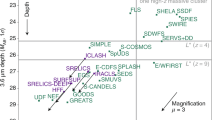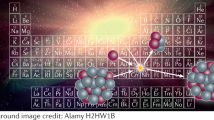Abstract
IN a recent issue of NATURE1, Dr. K. R. Popper discusses various interpretations of the nebular red-shifbs. He asserts that "as basis of a measuring system for cosmological purposes" we may use, for time measurement, "AC (atomic clocks)" or "LC (light clocks)", implying the constancy of atomic frequencies and the velocity of light respectively; and, for space measurement, "MR (material rods)" or "LR (light rods)". Three combinations of these "instruments" are possible: AC + MR; AC + LR; and LC + MR; and Dr. Popper proceeds to show that the corresponding interpretations of the red-shifts are "logically equivalent, and therefore do not describe alternative facts, but the same facts in alternative languages".
This is a preview of subscription content, access via your institution
Access options
Subscribe to this journal
Receive 51 print issues and online access
$199.00 per year
only $3.90 per issue
Buy this article
- Purchase on Springer Link
- Instant access to full article PDF
Prices may be subject to local taxes which are calculated during checkout
Similar content being viewed by others
References
NATURE, 145, 69 (1940).
NATURE, 139, 784 (1937).
NATURE, 144, 888 (1939).
Author information
Authors and Affiliations
Rights and permissions
About this article
Cite this article
DINGLE, H. Red-Shifts in Nebular Spectra and Scientific Practice. Nature 145, 224–225 (1940). https://doi.org/10.1038/145224c0
Issue Date:
DOI: https://doi.org/10.1038/145224c0
Comments
By submitting a comment you agree to abide by our Terms and Community Guidelines. If you find something abusive or that does not comply with our terms or guidelines please flag it as inappropriate.



